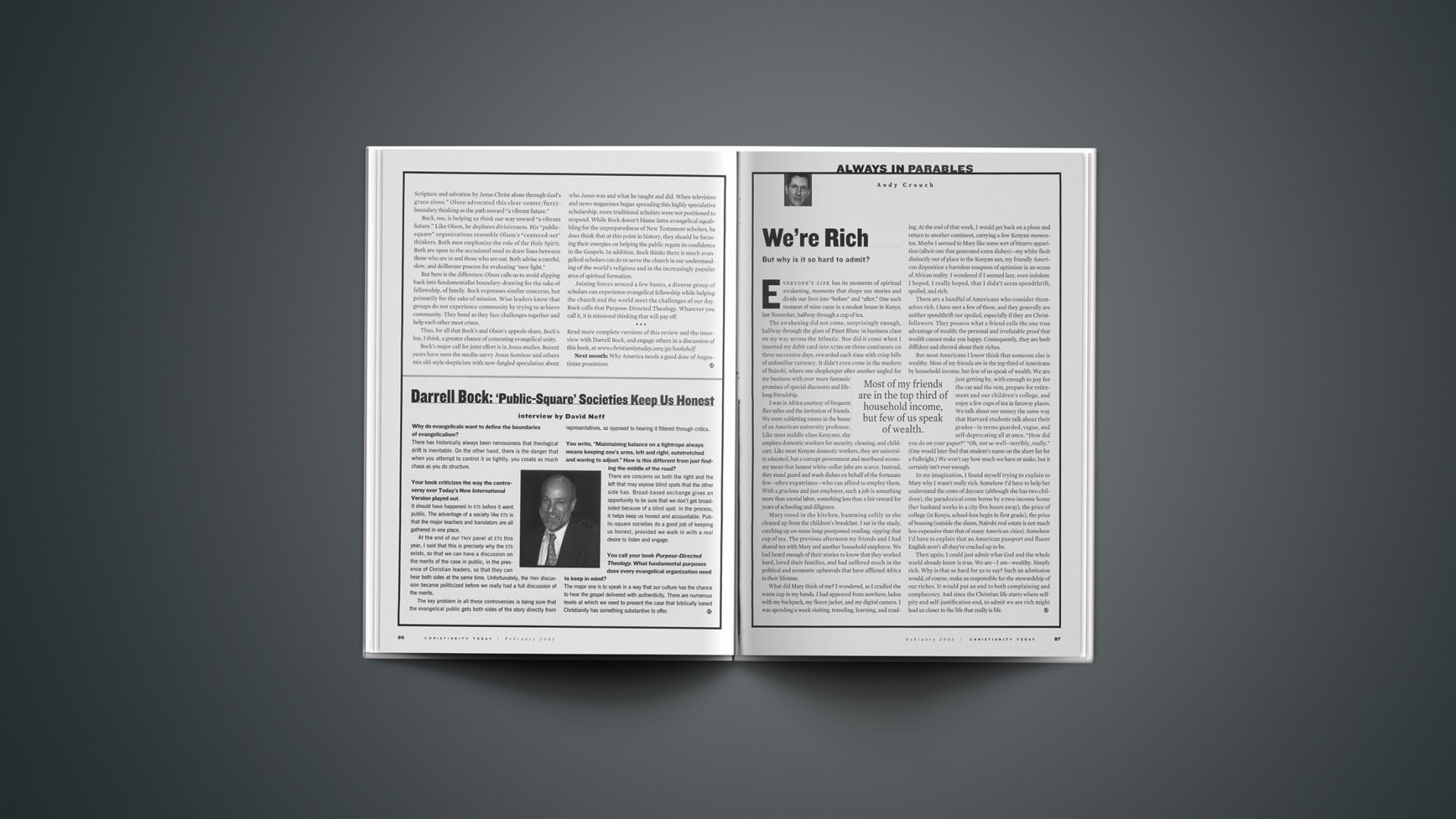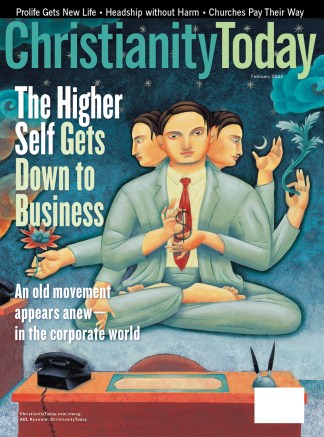Everyone’s life has its moments of spiritual awakening, moments that shape our stories and divide our lives into “before” and “after.” One such moment of mine came in a modest house in Kenya, last November, halfway through a cup of tea.
The awakening did not come, surprisingly enough, halfway through the glass of Pinot Blanc in business class on my way across the Atlantic. Nor did it come when I inserted my debit card into ATMs on three continents on three successive days, rewarded each time with crisp bills of unfamiliar currency. It didn’t even come in the markets of Nairobi, where one shopkeeper after another angled for my business with ever more fantastic promises of special discounts and lifelong friendship.
I was in Africa courtesy of frequent flier miles and the invitation of friends. We were subletting rooms in the home of an American university professor. Like most middle-class Kenyans, she employs domestic workers for security, cleaning, and childcare. Like most Kenyan domestic workers, they are university educated, but a corrupt government and moribund economy mean that honest white-collar jobs are scarce. Instead, they stand guard and wash dishes on behalf of the fortunate few-often expatriates-who can afford to employ them. With a gracious and just employer, such a job is something more than menial labor, something less than a fair reward for years of schooling and diligence.
Mary stood in the kitchen, humming softly as she cleaned up from the children’s breakfast. I sat in the study, catching up on some long-postponed reading, sipping that cup of tea. The previous afternoon my friends and I had shared tea with Mary and another household employee. We had heard enough of their stories to know that they worked hard, loved their families, and had suffered much in the political and economic upheavals that have afflicted Africa in their lifetime.
What did Mary think of me? I wondered, as I cradled the warm cup in my hands. I had appeared from nowhere, laden with my backpack, my fleece jacket, and my digital camera. I was spending a week visiting, traveling, learning, and reading. At the end of that week, I would get back on a plane and return to another continent, carrying a few Kenyan mementos. Maybe I seemed to Mary like some sort of bizarre apparition (albeit one that generated extra dishes)—my white flesh distinctly out of place in the Kenyan sun, my friendly American disposition a harmless teaspoon of optimism in an ocean of African reality. I wondered if I seemed lazy, even indolent. I hoped, I really hoped, that I didn’t seem spendthrift, spoiled, and rich.
There are a handful of Americans who consider themselves rich. I have met a few of them, and they generally are neither spendthrift nor spoiled, especially if they are Christ-followers. They possess what a friend calls the one true advantage of wealth: the personal and irrefutable proof that wealth cannot make you happy. Consequently, they are both diffident and shrewd about their riches.
But most Americans I know think that someone else is wealthy. Most of my friends are in the top third of Americans by household income, but few of us speak of wealth. We are just getting by, with enough to pay for the car and the rent, prepare for retirement and our children’s college, and enjoy a few cups of tea in faraway places. We talk about our money the same way that Harvard students talk about their grades—in terms guarded, vague, and self-deprecating all at once. “How did you do on your paper?” “Oh, not so well-terribly, really.” (One would later find that student’s name on the short list for a Fulbright.) We won’t say how much we have or make, but it certainly isn’t ever enough.
In my imagination, I found myself trying to explain to Mary why I wasn’t really rich. Somehow I’d have to help her understand the costs of daycare (although she has two children), the paradoxical costs borne by a two-income home (her husband works in a city five hours away), the price of college (in Kenya, school fees begin in first grade), the price of housing (outside the slums, Nairobi real estate is not much less expensive than that of many American cities). Somehow I’d have to explain that an American passport and fluent English aren’t all they’re cracked up to be.
Then again, I could just admit what God and the whole world already know is true. We are—I am—wealthy. Simply rich. Why is that so hard for us to say? Such an admission would, of course, make us responsible for the stewardship of our riches. It would put an end to both complaining and complacency. And since the Christian life starts where self-pity and self-justification end, to admit we are rich might also lead us closer to the life that is really life.
Copyright © 2003 Christianity Today. Click for reprint information.
Related Elsewhere
See our Money & Business area for Christianity Today coverage of ethical investing, stewardship, and financial ethics.
In 2000, CT looked at how evangelicals got so wealthy and what it has done to them.
Crouch is editor-in-chief of re:generation quarterly.
Many of Crouch’s other writings are available at his and his wife’s website.
Earlier Andy Crouch columns for Christianity Today include:
Blinded by Pop Praise | To see God “high and lifted up,” just open your eyes. (Dec. 17, 2002)
The Future Is P.O.D. | Multicultural voices have an edge in reaching a rapidly changing America. (October 12, 2002)
Rekindling Old Fires | We can resist technology’s chilling effects on how we spend time together. (August 2, 2002)
Interstate Nation | The national highway system is a lesson in how to transform a nation. (June 21, 2002)
Amplified Versions | Worship wars come down to music and a power plug. (April 17, 2002)
Thou Shalt Be Cool | This enduring American slang leaves plenty out in the cold. (March 18, 2002)
Borrowing Against Time | We live in a fallen world. We will die. We need to face that. (Jan. 17, 2002)
Grounded | Our technologies give us an illusion of omnipresence—most of the time. (Nov. 15, 2001)
Zarathustra Shrugged | What apologetics should look like in a skeptical age. (Sept. 5, 2001)
Consuming Passions | One man’s “testimony” from the First Great Mammon Awakening. (July 10, 2001)
Generation Misinformation | Forget the latest PowerPoint seminars on Generations X-Z. (May 16, 01)
Dead Authors Society | We’re no longer interested in tasting death but only little morsels of cheer. (Mar. 28, 2001)
Promises, Promises | Our technology works. But all idols do at first. (Feb. 21, 2001)
A Testimony in Reverse | I have discovered how inconvenient it can be when God actually does speak. (Feb. 5, 2001)
Crunching the Numbers | A modest proposal for measuring what really matters in church life. (Dec. 20, 2000)









